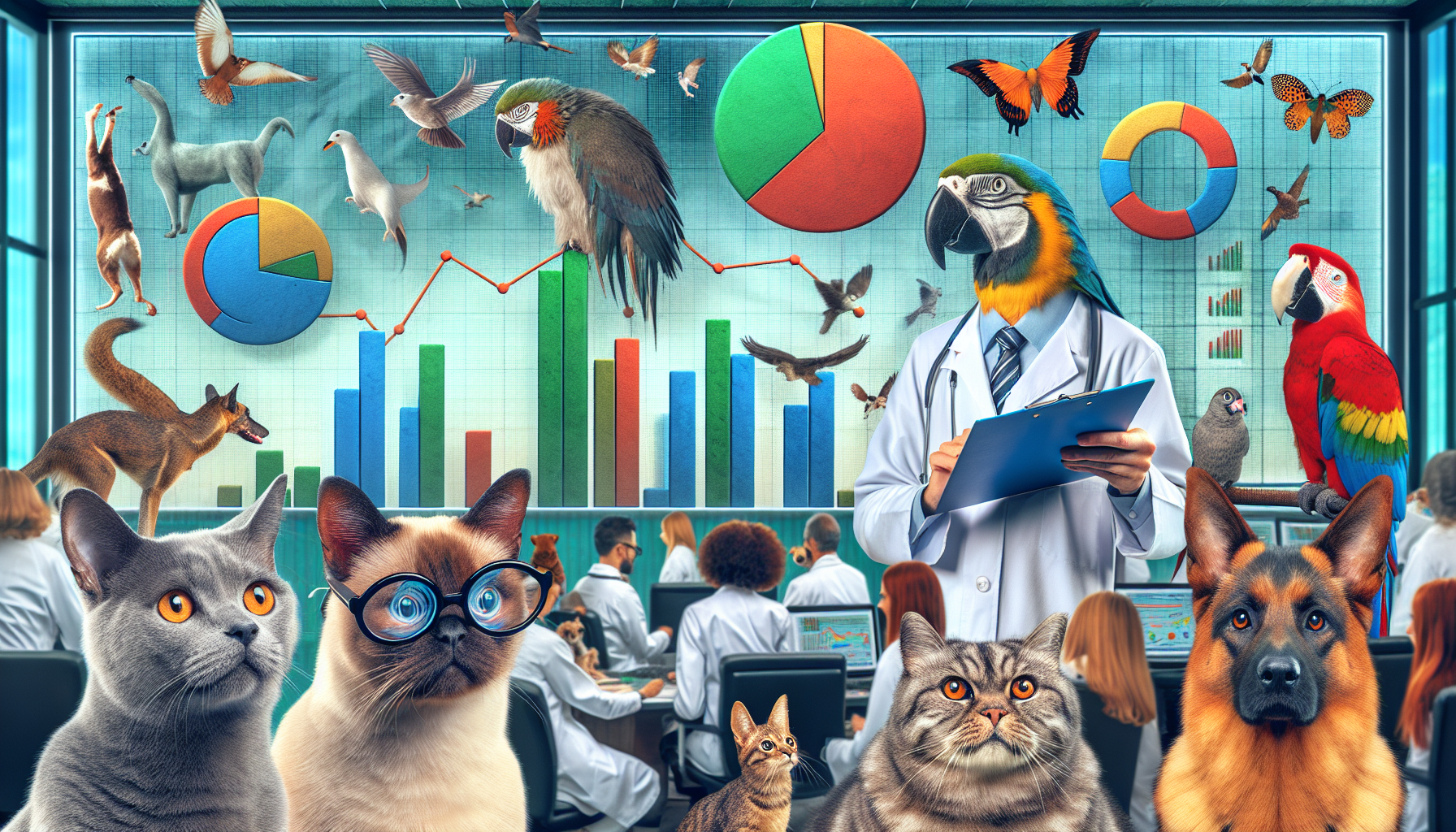Optimizing Your Practice: Top Strategies for Accounting for Veterinarians
Are you navigating the complex financial landscape of your veterinary practice and wondering how to enhance its profitability and stability? Effective accounting for veterinarians goes beyond basic bookkeeping; it encompasses specialized strategies tailored to the unique challenges of veterinary medicine. This article will guide you through critical financial management practices, including tax planning, cash flow, and leveraging specialized veterinary accounting services to set your practice up for success.
Key Takeaways
- Veterinary accounting is unique and complex, requiring industry-specific knowledge to manage financial challenges like maintaining animal records, integrating specialized vendor systems, and allocating time and resources effectively.
- Financial management for veterinary practices is more than just bookkeeping; it includes critical tasks like tracking expenses, managing cash flow, efficient budgeting, and strategic tax planning to optimize the practice’s financial health.
- Leveraging technology in veterinary accounting, such as cloud-based systems and Veterinary Practice Management Software (VPMS), can streamline operations, enhance data security, and contribute to smarter business decision-making.
The Importance of Specialized Veterinary Accounting

Veterinary practices encounter unique financial challenges, requiring a distinct approach to accounting. From managing distinct working patterns to maintaining animal history records and specialized vendor integration, the financial management of a veterinary practice is no walk in the park. Understanding financial goals intimately and navigating the complex, unique aspects of veterinary accounting are necessary.
Outsourced specialized accounting can significantly benefit veterinarians by:
- Reducing in-house costs and stress
- Allowing more time and attention to be dedicated to veterinarian care
- Providing valuable business advice
- Offering industry-specific knowledge
- Providing customized financial insights and strategies
Specialized veterinary accounting services pave the way for a secure, profitable future for practice owners.
Financial Management for Veterinary Practices

Managing finances in a veterinary practice goes beyond basic bookkeeping. It involves tracking expenses, managing cash flow, and classifying assets. Veterinary accountants play a key role in the financial health of a practice by managing asset classification, capital investments, and operational expenses.
They also provide valuable insights on the business side when deciding whether to own or lease office space and medical equipment, which should be based on the practice’s specific circumstances and growth projections.
Cash Flow Management
Cash flow is the lifeblood of any business, and veterinary practices are no exception. Effective cash flow management is pivotal for maintaining financial stability and facilitating day-to-day operations. This involves controlling recurring costs, speeding up payments, and ensuring the balance sheet is in order.
Strategizing is equally important as keeping the numbers straight in effective cash flow management. Here are some strategies to enhance cash flow:
- Marketing services effectively
- Monitoring accounts receivable
- Utilizing automatic payments
- Offering multiple payment options
In addition, regular meetings with financial advisors and the veterinary team, as well as engaging a CPA early on, are critical for managing cash flow, budgeting, and forecasting.
Budgeting for Success
For any veterinary practice, a sound budget serves as a roadmap to financial success. Utilizing a standard chart of accounts and incorporating historical income and expenditure data can establish a structured starting point for creating a veterinary practice budget.
Rather than being a static document, a budget should be proactively designed, factoring in the practice’s unique circumstances and objectives. It should encompass:
- Projected revenue
- Cost of goods sold (COGS)
- Administration costs
- Team expenses
- Facilities costs
Consideration of seasonality and economic trends is necessary to enhance the accuracy of the budget, and it should be adjusted to account for known price increases, inflation, or shifts in the practice’s operations.
Tax Planning Strategies
For any veterinary practice, tax planning and tax compliance form critical aspects of financial management. Effective tax strategies can significantly impact the bottom line. For instance, reviewing entity selection, such as LLCs taxed as sole proprietorships or S corporations, can optimize tax outcomes depending on the practice’s size and revenue.
Identifying tax-saving strategies is a crucial role played by veterinary CPAs. Some tax-saving strategies for veterinary practices include:
- Maximizing the Qualified Business Income Deduction (QBI)
- Optimizing equipment purchase deductions
- Deferring revenue
- Accelerating expenses
CPAs can guide veterinary practices through a complex tax landscape and help them implement these strategies.
Veterinary Practice Performance Analysis

Delivering quality care to patients is just one aspect of managing a veterinary practice. It requires an understanding of the financial health of the practice, and this is where veterinary CPAs come in. With services like financial planning, business analysis, and system enhancements, CPAs provide essential insights into profitability, cash flows, and budgets.
Assessing various aspects of a practice’s health and aligning with industry standards require key performance indicators (KPIs), industry benchmarks, and other metrics. Monthly financial tracking and real-time reports provided by CPAs and practice management software empower veterinarians to make informed financial decisions.
Key Services Offered by Veterinary CPAs

Veterinary CPAs offer a range of services that go beyond just managing finances. They can:
- Organize even the most disorganized financial records for bookkeeping purposes
- Manage budgets
- Accurately track expenses
- Maintain organized payroll records
These services are instrumental in effectively managing the financial aspects of a veterinary practice, including veterinary hospitals and animal hospitals.
Payroll management is a key service of veterinary CPAs, ensuring accuracy in recording team wages and benefits, which forms a critical part of the financial health of a veterinary practice. Managing accounts payable is another significant service offered, which includes tax return purposes, bill paying, and financial statement services.
And with the use of encrypted software, veterinary CPAs prioritize the security and accuracy of financial reporting, ensuring up-to-date financial statements, essential for a stress-free tax season and safeguarding sensitive data.
Choosing the Right CPA for Your Veterinary Practice
Making a significant decision includes choosing the right CPA for your veterinary practice. It’s not just about finding someone who understands numbers, but someone who understands the unique financial landscape of the veterinary industry.
Verification of their expertise is crucial when selecting a CPA. Here are some questions to ask:
- What percentage of your clients are in the veterinary field?
- Are you familiar with the American Animal Hospital Association (AAHA) Chart of Accounts?
- Are you involved in professional veterinary associations?
A competent veterinary CPA should offer the following services as a part of their CPA firm:
- Business advice tailored to your practice
- Tax planning and financial advising
- Payroll processing
- Bank account reconciliation
- Bill payments
- Developing business growth strategies
The Role of Technology in Veterinary Accounting

Like many other business sectors, veterinary accounting has also been revolutionized by technology. Cloud-based accounting systems eliminate the need for complex installations, hardware upgrades, and ongoing maintenance, reducing time and cost investments.
Beyond the cloud, practice management software (VPMS) improves efficiency and accuracy in accounting and record-keeping within veterinary practices. Practice managers can benefit from digital platforms such as Weave, which help automate the measurement of KPIs and monitoring of business metrics, providing insights for improvement.
From streamlining workflows and automating tasks to enhancing data security and regulation compliance, technology plays a pivotal role in the financial management of a veterinary practice.
Navigating Regulatory Changes and Industry Challenges
Regulatory changes and industry challenges inevitably impact the veterinary profession. From FDA guidance impacting the documentation and availability of compounded medications to anticipated workforce shortages, veterinary practices must navigate a constantly shifting landscape in the realm of veterinary medicine.
Veterinary CPAs have a crucial role in such a complex environment, including:
- Helping maintain financial stability
- Adapting to regulatory changes
- Providing accurate and consistent financial reporting
- Assisting practices in informed decision-making
- Ensuring regulatory compliance amidst frequent changes
Employee Benefits and Financial Wellness
The success of a veterinary practice hinges on a positive practice culture and confident financial decision-making. Offering employee discounts can contribute to attracting and retaining employees, boosting morale, and increasing staff loyalty.
Financial wellness programs can also alleviate stress for veterinary teams by offering tools for day-to-day financial pressures and future planning. These programs often fill the gap left by insufficient financial education in veterinary schools and lead to a more positive practice culture.
Case Studies: Successful Veterinary Practices and Their Accounting Strategies
Exploring some real-life case studies can help in fully appreciating the impact of effective accounting strategies. One veterinary clinic, for instance, increased its profitability by switching to a cloud-based accounting system that improved financial data accessibility and accuracy.
Another veterinary practice experienced a significant turnaround by restructuring their debt and optimizing their tax strategy with the help of a specialized veterinary CPA. These case studies highlight the tangible benefits of implementing effective accounting strategies in veterinary practices.
Summary
In conclusion, veterinary accounting is a specialized field that requires an intimate understanding of the unique financial challenges faced by veterinarians. From managing cash flow and budgeting for success to navigating regulatory changes and leveraging technology, there’s a lot to consider. But with the right CPA and effective accounting strategies, veterinary practices can ensure a secure and profitable future.
Frequently Asked Questions
What is one of the largest expenses for veterinary practice?
One of the largest expenses for a veterinary practice is the staffing costs. It can be quite challenging for practice managers and owners to control these costs.
What is the average net profit for a veterinary practice?
The average net profit for a veterinary practice is estimated to be around 10% to 15% for small animal hospitals and 15% to 25% for emergency and specialty practices.
What is turnover for veterinarians?
The turnover rate for veterinarians varies depending on the position, ranging from 13% for managers to 25% for veterinary technicians. This means that a significant number of individuals in these roles are either leaving or starting a job at any given time.
What are the tangible assets for a veterinary practice?
The tangible assets for a veterinary practice include veterinary medical equipment, office furniture, and inventory. Goodwill is an essential intangible asset for a veterinary practice.
Why is specialized accounting important for veterinary practices?
Specialized accounting is important for veterinary practices because it offers tailored financial strategies and industry-specific knowledge to overcome unique financial challenges and ensure a secure and profitable future for practice owners.

